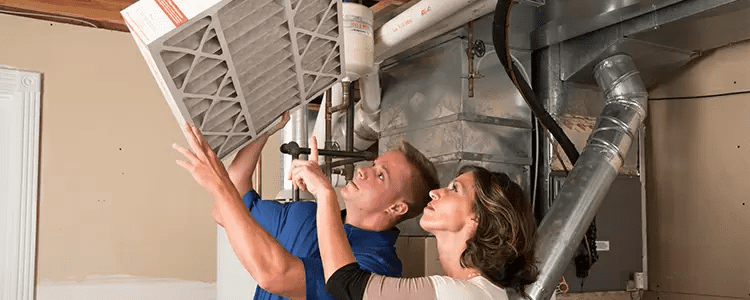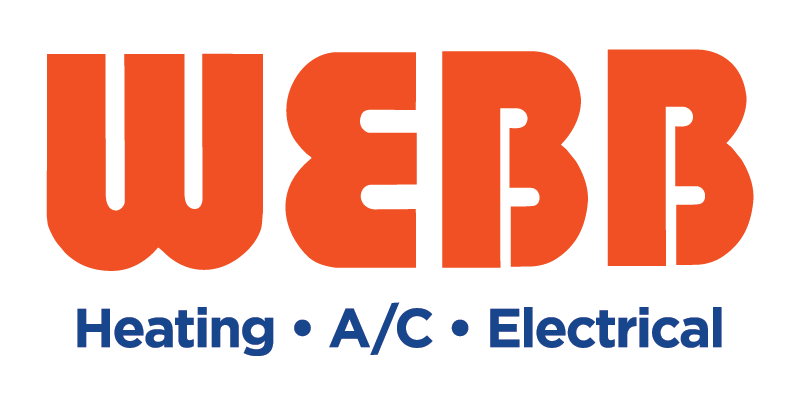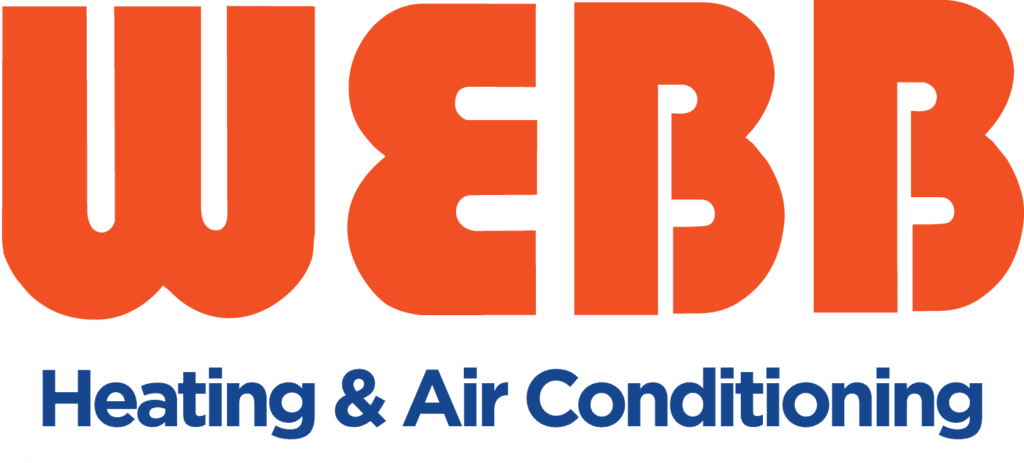The Difference Between Furnace, Heater, and Boiler and Which You Need in North Carolina

When you’re replacing your heating system or choosing one for a new home, understanding the differences between furnaces, heaters, and boilers helps you pick what actually fits your situation. These systems work differently, cost different amounts to install and operate, and suit different home layouts and needs.
At Webb Heating, Air Conditioning, and Electrical, we help North Carolina homeowners evaluate these options based on their home’s existing infrastructure, heating requirements, and budget. Knowing how each system works and what it demands from your home makes it easier to choose the right one.
Understanding Furnaces, Heaters and Boilers
Each system heats your home in a unique way, so knowing how they operate makes it easier to spot which one fits your needs. Below, we’ll break down what furnaces, heaters, and boilers do and how they work.
What Are Furnaces?
A furnace uses gas or electric elements to heat air and then a blower pushes that warm air through your home’s ducts and vents. Modern furnaces can last years with proper maintenance and changing filters every 2–3 months keeps airflow clean and efficient.
Here’s how it works:
- The furnace return vents draw in cooler air.
- The air passes over burners or coils, where it heats up.
- A blower sends the warmed air into each room through supply vents.
Unlike space heaters that heat only one spot or boilers that circulate hot water, furnaces rely on ductwork to deliver consistent warmth throughout the entire house, and they’ll use those same ducts for cooling when you switch to central air in summer.
What Are Heaters?
Heaters, including electric space heaters and baseboard units, warm individual rooms without ductwork. Many modern space heaters include safety features such as tip-over shutoff and overheat protection.
Here’s how they work:
- Space heaters plug into outlets and use electric coils or ceramic elements to generate heat instantly.
- Baseboard heaters mount along walls and heat air through convection as it rises over heated fins.
Unlike furnaces or boilers, heaters operate independently in each room, offering quick, targeted warmth without the need for installation or existing piping.
What Are Boilers?
Boilers heat water and circulate it through radiators or tubing beneath your floors to radiate heat throughout your home. With proper annual maintenance like system flushes and pressure checks, boilers can last longer than furnaces.
Here’s how they work:
- The boiler heats water using gas burners or electric elements.
- A pump pushes the hot water through pipes to radiators or in-floor tubing.
- As the water cools, it returns to the boiler to be reheated.
Unlike forced-air furnaces that move air, boilers deliver gentle, draft-free warmth that lingers even after the system cycles off. This may be ideal for steady comfort in older homes with existing piping.
Pros and Cons in North Carolina Context
Each heating system has advantages and limitations that matter differently depending on your home and situation.
Pros and Cons of Furnaces
Because furnaces heat air and push it through your home’s ductwork, you can feel their warmth almost immediately. Their ability to switch from heating to cooling using the same ducts makes them a true all-season solution.
Here’s why many homeowners prefer furnaces’:
- Whole-home comfort: Ducted systems distribute heat evenly, keeping every room at a consistent temperature.
- Quick response: Air begins warming within minutes, ideal during sudden temperature drops.
- Modern efficiency: New models often achieve AFUE ratings above 95%, improving comfort while lowering utility costs.
That said, furnaces have a few trade-offs to consider. Ductwork can lose efficiency through leaks or poor insulation, forcing the system to work harder. Air movement creates noise that’s noticeable in quiet spaces, especially in older homes. Filters also need replacement every two to three months, and ducts require occasional cleaning to maintain air quality and airflow.
Pros and Cons of Heaters
Heaters offer flexibility for targeted warmth where central systems fall short. They’re simple to operate, inexpensive to buy, and fast to deliver heat.
Why homeowners often choose standalone heaters:
- No installation needed: Plug-and-play convenience makes them accessible anywhere.
- Zone heating: Warm only the spaces you use most, reducing unnecessary energy use.
- Safety features: Modern designs include tip-over shutoff and overheat protection for peace of mind.
Still, heaters are best viewed as supplemental, not primary, systems. They’re designed for small spaces, and running several at once can quickly raise your electricity bills. Their exposed heating elements also require care, so keep them clear of furniture, curtains, and other flammable items to ensure safe operation.
Pros and Cons of Boilers
Boilers use water rather than air to heat your home, circulating it through radiators or in-floor piping for steady, radiant warmth. This approach creates comfort that feels even and consistent, without the airflow or noise associated with forced-air systems.
Here’s why boilers appeal to many homeowners:
- Exceptionally even heat: Warmth spreads naturally from floors or radiators, eliminating drafts.
- Quiet operation: No fans or vents mean near-silent performance.
- Low maintenance: With regular annual checkups, boilers can last several years .
However, these benefits come with some limitations. Boilers are more expensive to install, especially in homes without existing radiators or hydronic piping. They don’t provide cooling, so a separate AC setup is required for North Carolina’s humid summers. And because water takes longer to heat and circulate than air, adjusting to a new temperature can feel slower compared to a forced-air furnace.
Which System Do You Need?
Once you understand how each system works, the next step is figuring out which one fits your home best. The right answer depends on your space, lifestyle, and comfort priorities.
If your home already has ductwork, or if you’d like one system to handle both heating and cooling, a furnace is usually the simplest and most efficient path. It provides consistent comfort across the entire home and works seamlessly with central air.
Choose a furnace if:
- You want quick, even heating for every room
- You prefer a single, integrated setup for all-season comfort
A heater is ideal when you only need warmth in specific spots rather than throughout your home. Portable units or built-in baseboards let you add heat where your main system falls short, whether that’s a basement, home office, or enclosed porch.
Choose a heater if:
- You need zone-specific warmth or a backup heat source
- You value simplicity and low up-front cost
For homeowners who prioritize quiet comfort and air quality, a boiler offers a more refined option. These systems provide steady heat without blowing air or kicking up dust, making them a strong choice for people with allergies or older homes already equipped with radiant piping.
Choose a boiler if:
- You prefer silent, draft-free heating
- You already have, or plan to install, radiant floor or radiator systems
Every home strikes a different balance between comfort, cost, and convenience. Webb Heating, Air Conditioning, and Electrical helps homeowners across the Piedmont Triad weigh those factors carefully so the system you install today still feels like the right choice years from now.
Why Choose Webb Heating, Air Conditioning, and Electrical?
Webb Heating, Air Conditioning, and Electrical has installed and serviced furnaces, heaters, and boilers throughout North Carolina for years. We understand how different systems perform in our state’s climate and can evaluate your home’s specific needs, like existing ductwork, layout, heating and cooling requirements, and budget.
Whether you’re replacing an aging system, dealing with inadequate heating, or installing a system in a new home, we provide honest guidance based on what works best for your situation. Our team explains the tradeoffs between different options so you can make a confident decision.
Ready to explore which heating system fits your home? Contact Webb Heating, Air Conditioning, and Electrical today to schedule an assessment. We’ll evaluate your options and help you choose a system that delivers the comfort and efficiency you need.

